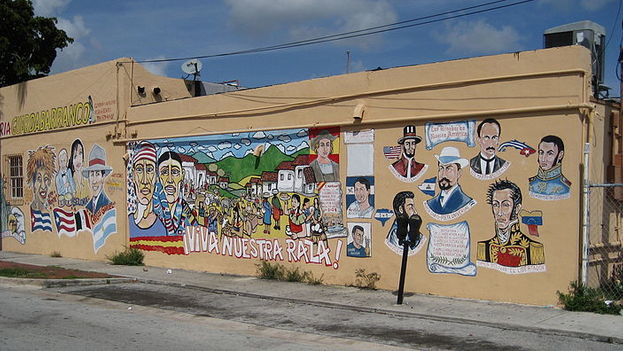
![]() 14ymedio, Jose Hernandez Fonseca, 5 January 2016 – When the current and voluminous world news talks about Cuba it is understood that it is talking about the Castro brothers’ Cuba. This, of course, for the quarter of the island’s population that lives abroad, is an inaccuracy. The real Cuba is the sum of the two separate worlds: the island governed by the Castro regime and the Cubans who live scattered around the rest of the world.
14ymedio, Jose Hernandez Fonseca, 5 January 2016 – When the current and voluminous world news talks about Cuba it is understood that it is talking about the Castro brothers’ Cuba. This, of course, for the quarter of the island’s population that lives abroad, is an inaccuracy. The real Cuba is the sum of the two separate worlds: the island governed by the Castro regime and the Cubans who live scattered around the rest of the world.
In reality, the Cuban nation is a dichotomy. There is the Cuba that survives on the island, whose basic aspiration is to leave and go abroad to free itself from an impoverished dictatorship; and the Cuba that has been reborn far from home, in other latitudes, that longs for and venerates the island. In reality they are two Cubas: one subjugated and poor and the other burgeoning and rich, as the island was in the past and will be in the future. In any event, Miami is what Havana would have been without Fidel Castro. continue reading
It is important to say that Cuba, prior to the Castro dictatorship, had the highest indicators of economic and social development in all of Latin America: the second highest per capita income, the highest per capita consumption of electricity, the lowest rate of illiteracy, the greatest number of daily newspapers, the highest number of cars per capita, the highest consumption of protein and one of the highest numbers of cattle per inhabitant, the highest average wage, more movie theaters than Paris and a long list of other attributes that included being the center of the world’s music.
It is true that before the current Castro dictatorship there was another dictatorship, but that one limited itself to circumscribing political liberties, allowing economic, social and human development typical of the first world. The people of Cuba fought against the previous dictatorship, but never with the intention to create an impoverished totalitarianism like the absurdity imposed by the Castros.
It must be said, moreover, that “the best” of Cuban society is outside the island. The best athletes, artists, writers, engineers, architects, intellectuals, journalists, comedians, musicians, teachers, politicians, among other professionals – or simply workers – live outside the island, forced by the mandate of obedience and emasculation that has been militarily imposed within Cuba by the Castro regime.
Faced with this reality, it is inappropriate to try to solve “the Cuban problem” without recourse to the effort, capital, entrepreneurship and leadership of the quarter of the Cuban population abroad. The effort of the United States to inject the entrepreneurial and/or democratic virus within the island means nothing, if the most dynamic part of the Cuban population is prevented from participating, investing, leading and even governing, the Cuban nation of the future.
Let’s not fool ourselves, no nation has emerged from the status of Haitianization that Cuba is currently subjected to without the participation of its best children, those who have triumphed in the conditions of exile, not only in the United States but everywhere in the world. Cuban intellectuals will insist on their patriotic values, whether they love or hate the dictatorship and its allies. The recognition of every Cuban is the only formula to shape the Cuban nation of the future.
